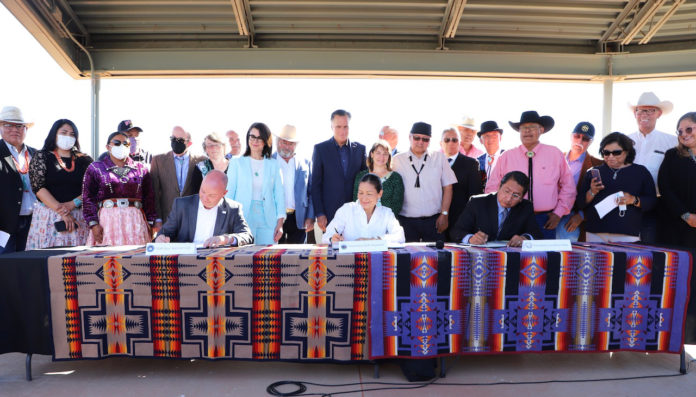OLJATO-MONUMENT VALLEY, UT – Members of the 24th Navajo Nation Council were joined by President Jonathan Nez and Vice President Myron Lizer to officially welcome Secretary of the Interior Deb Haaland, U.S. Senator Mitt Romney (R-UT), Utah Governor Spencer Cox, and Lt. Governor Deidre Henderson for a historic signing ceremony to execute the Navajo Utah Water Rights Settlement Agreement.
The agreement, which was approved by Congress in 2020, will recognize the water rights of the Navajo Nation in Utah and authorizes funding for water infrastructure development. President Joe Biden signed the $1.2 trillion Infrastructure Investment and Jobs Act that allocates $2.5 billion to address Indian water rights settlements.
“We are located on the ancestral lands of our Diné people,” said Navajo Nation President Nez. “Since time immemorial, Diné people have resided here and have continued to create their permanent homeland and livelihood within this region. Present day, this area is home to the community of Oljato, which is one of the eight Navajo-Utah communities who will directly benefit from the Navajo-Utah Water Rights Settlement Agreement. This historic occasion is the product of decades of hard work and diligence of all parties, and will benefit over 40 percent of Navajo homes in San Juan County alone. These communities located in this area of Utah, have been at the forefront of water insecurity and have managed to endured years of lack of access to clean, running water. I am pleased to welcome Secretary Haaland, Senator Romney, Governor Cox, and all of the leaders here today to mark this historic achievement.”
“This is a historic day for Utah Navajo families,” said Council Delegate Herman Daniels, Jr. “We send our appreciation to the Navajo Nation Council and President Jonathan Nez for holding the federal government and the State of Utah accountable for our most precious resource – our Diné water. The Bipartisan Infrastructure Law now allows us to upgrade our water infrastructure projects and expand water delivery to the rural areas of Utah Navajo. Now our elders, veterans, and most vulnerable relatives will soon have access to clean, potable drinking water in their homes.”
The Navajo Utah Water Rights Settlement now confirms the Navajo Nation’s right to deplete 81,500 acre-feet of water per year from Utah’s Colorado River Basin apportionment and authorizes around $220 million for water infrastructure projects. The state has already invested $8 million in the Navajo Utah Settlement Trust Fund.
“Water is life – those are the words that we hear from our elders and youth so often,” said Navajo Nation Vice President Lizer. “Today’s signing is the culmination of many years of work and commitment of past and present leaders. This is not about what we did as leaders, but what is to come for our people by way of this agreement between two the United States, the State of Utah, and the Navajo Nation. This agreement represents life for our Navajo people – for the generations who are yet to be born and those who continue to aspire for a greater quality of life.”
“Our families celebrate this moment in history after decades of fighting for the Navajo Utah Water Rights Settlement,” said Council Delegate Charlaine Tso. “It is clear drought conditions are affecting water levels across the country. Many of our elders haul drinking water from miles away while we work to get proper water infrastructure projects completed. This settlement allows us to begin connecting our water lines to the most rural areas of my chapters.”
According to the State of Utah, over 5,000 Navajo people reside in the Utah portion of the Navajo Nation. Only half of the households within this area have indoor plumbing, must haul water over vast distances, and many lack access to clean drinking water.
In 2015, the Navajo Water Rights Commission, Navajo Department of Water Resources, and the Navajo Department of Justice arrived at a settlement of claims that establishes quantified water rights. Last week, the Naabik’íyáti’ Committee also passed Legislation No. 0094-22 approving and accepting the revised Navajo Utah Water Rights Settlement Agreement.
“The nation-to-nation relationship brought us together to resolve the Navajo Utah Water Rights Settlement Agreement,” said Resources and Development Committee Chairman Rickie Nez. “Tó’éí’iina means our water is life – it sustains us and provides for our livestock, rejuvenates our cornfields, and strengthens us as human beings. This is a historic day for the Navajo people as clean drinking water can now flow freely into the communities of our Utah Navajo families.”
The Navajo Nation Council presented an honorary blanket commending the leadership of Senator Mitt Romney for sponsoring the settlement bill passed by the U.S. Senate last year. Noting the historic nature of the day, Interior Secretary Deb Haaland commended Navajo and Utah leaders for successfully negotiating the agreement.
“Having modern water infrastructure is not only crucial to the health of our kids and families – it’s also important to economic opportunity, job creation, and responding to the intensifying effects of climate change,” said Secretary Haaland. “As we seek to strengthen Indigenous communities and support tribal self-governance, today’s action and investments from President Biden’s Bipartisan Infrastructure Law will help provide the Navajo Nation with the autonomy and flexibility to design and build appropriate water projects that will address current and future water needs.”














































